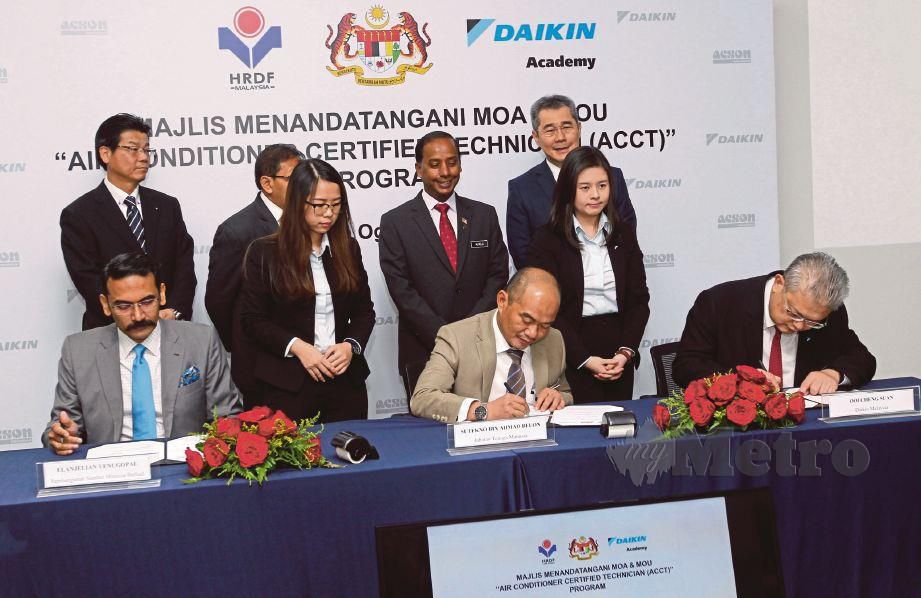 Prime Minister Datuk Seri Najib Abdul Razak officiating the launch of TVET Malaysia at the Advanced Technology Training Centre (ADTEC) in Shah Alam on Sept 27, 2017. — Sunpix by Zulfadhli Zaki
Prime Minister Datuk Seri Najib Abdul Razak officiating the launch of TVET Malaysia at the Advanced Technology Training Centre (ADTEC) in Shah Alam on Sept 27, 2017. — Sunpix by Zulfadhli Zaki
SHAH ALAM: Prime Minister Datuk Seri Najib Abdul Razak today outlined several initiatives to transform Technical and Vocational Education and Training in the country, which includes developing a TVET Masterplan.
He said the masterplan will be streamlined by the Ministry of Human Resources with other ministries involved in TVET like the Higher Education Ministry and Education Ministry.
Secondly, the prime minister said the government would allocate RM50 million from 30% of Pembangunan Sumber Manusia Bhd’s (PSMB) accumulated funds, for TVET.
“For the information of all, PSMB has set aside 30% of levies collected by the Human Resource Development Fund as a pool fund to implement strategic programmes as an effort to support achieving of national objectives in raising the level of skilled workers in Malaysia,” he said when launching TVET Malaysia at the Advanced Technology Training Centre (ADTEC) here today.
Also present were Human Resource Minister Datuk Seri Richard Riot Jaem, Higher Education Minister Datuk Seri Idris Jusoh and Education Minister Datuk Seri Mahdzir Khalid.
Najib said that to transform TVET, special attention must also be given to Industrial Revolution 4.0 so as to create a workforce that is able to compete on the world stage.
He said that to support this revolution, collaboration was being forged with Skills Development Centres, polytechnics, universities and companies, entailing an allocation of RM75 million.
“Besides this, the government will also review the rate and charges related to filing of intellectual property as well as incentives that are suitable to encourage more innovation especially through the TVET institution,” he said.
The prime minister said human capital that was highly skilled was very important in transforming the national economy and function to narrow the the skills gap the country was facing, particularly by industry.
As such, he said that with Malaysia heading to become a high income nation, the government was committed to five core thrusts in transforming TVET including training 300,000 Malaysians from the lower income or B40 group from now until 2025.
The B40 group, Najib said, involved rural residents, urban poor, Orang Asli, school leavers and dropouts, single mothers and unemployed people.
“The government also plans to introduce TVET to tahfiz students as value add for them, whereby besides memorising the Quran they would also have skills in TVET.
“At the same time, from now till 2025, the government will make efforts to train and raise the number of teaching staff in TVET, whereby we are targeting 20,000 more Vocational Training Officers, thus contributing to training a higher number of people to have TVET qualifications.
“Besides that, the number of specialist trainers in TVET will also be increased by 4,000 people in various TVET fields by 2025,” he said.
As for the second thrust, Najib said the government was committed to strengthen and intensify strategic Public-Private Partnership cooperation or between TVET and industry to create synergy in developing quality human capital.
The strategic cooperation, he explained, could be realised in various forms like industry contributing expertise or machinery and equipment for training in certain fields where the industrial market badly needs such human capital.
“Thirdly, for TVET graduates, career opportunities are not only limited in the industry, TVET graduates can also venture into business, especially technopreneurship or become technopreneurs in technical fields.
“Fourthly, in the 2017 Budget, the government has allocated RM20 million for the purpose of matching grants, where the financial provision is given at the same value of contributions received from industry for high impact TVET programmes. Surely, this grant can be utilised in joint ventures between public agencies and the private sector to train and produce more skilled manpower.
“Fifth is to brand the TVET institutions in this country as TVET Malaysia, where all TVET institutions under various ministries are united as a great collaboration to train Malaysians, especially young people to become a highly skilled technical workforce,” he said.
The prime minister said TVET Malaysia should be used as an ongoing campaign to attract Malaysians to choose TVET as the main choice in their career path.
Indirectly, Najib said it would be able to change and correct the negative perceptions of the people who often thought that TVET was the second or last choice and was only ventured into by those who did not have good academic qualifications.
In conjunction with the launch of TVET Malaysia, the prime minister also attended a TN50 dialogue session with students from TVET institutions nationwide, which aimed at gaining their aspirations in the field of human capital development in the future.
The event also recognised seven TVET icons who are successful in their career and business.
Source: BERNAMA

 Prime Minister Datuk Seri Najib Abdul Razak officiating the launch of TVET Malaysia at the Advanced Technology Training Centre (ADTEC) in Shah Alam on Sept 27, 2017. — Sunpix by Zulfadhli Zaki
Prime Minister Datuk Seri Najib Abdul Razak officiating the launch of TVET Malaysia at the Advanced Technology Training Centre (ADTEC) in Shah Alam on Sept 27, 2017. — Sunpix by Zulfadhli Zaki